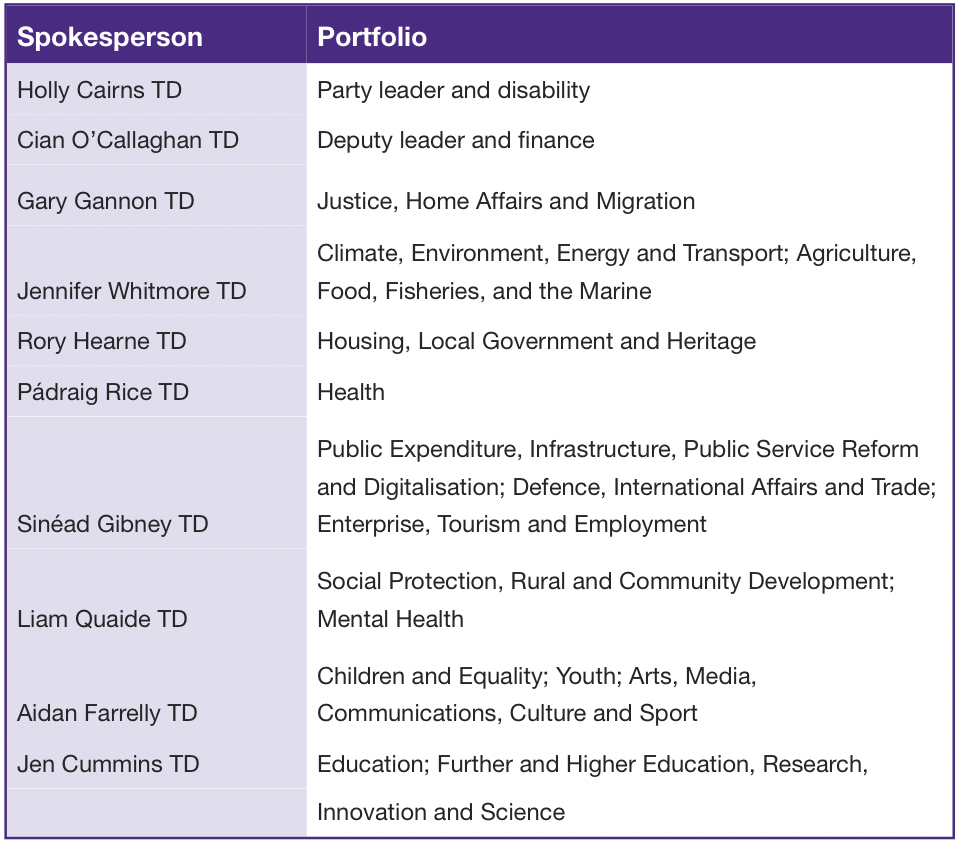Opposition frontbenches Appointed

Following the general election in November 2024, the job of holding the new government to account will primarily remain with Sinn Féin, the Labour Party, and the Social Democrats. eolas Magazine profiles the parties’ frontbenches.
Sinn Féin’s mild front bench refresh for the 34th Dáil sees Mary Lou McDonald TD, Pearse Doherty TD, Eoin Ó Broin TD, and David Cullinane TD maintain their roles as party leader, finance spokesperson, housing spokesperson, and health spokesperson, respectively.

However, significant changes have taken place elsewhere, with 11 changes to the Sinn Féin front bench in total. Matt Carthy TD has been reshuffled from defence and foreign affairs to justice, home affairs and migration, while Donnchadh Ó Laoghaire TD assumes Carthy’s former role, shadowing Tánaiste and Fine Gael leader Simon Harris TD.
Two first-time TDs have been appointed to the front bench: Joanna Byrne as spokesperson for Arts, Media, Communications, Culture and Sport, and Donna McGettigan as spokesperson for Further and Higher Education, Research, innovation and Science.
Sinn Féin president Mary Lou McDonald TD said: “This is a front bench in which women are represented equally, and which is regionally balanced, and we intend to go toe to toe with this government from day one.”
 By vote share, the 2024 election was the second worst in the history of the Labour Party. However, amid favourable transfer patterns, the party simultaneously almost doubled its number of TDs, with 11 deputies elected to the Dáil under the Labour banner.
By vote share, the 2024 election was the second worst in the history of the Labour Party. However, amid favourable transfer patterns, the party simultaneously almost doubled its number of TDs, with 11 deputies elected to the Dáil under the Labour banner.

Unlike the other two main opposition parties, Labour has nominated party spokespersons from the Seanad and from the European Parliament, with Aodhán Ó Ríordáin appointed as the party’s spokesperson for Dublin, while two senators, Nessa Cosgrove and Laura Harmon, also assume front bench roles.
Party leader Ivana Bacik also assumes the party’s spokesperson position for the North, while Ciarán Ahern TD is set to shadow Minister Darragh O’Brien’s portfolio at DECC and the Department of Transport. Elsewhere, Conor Sheehan TD is the party’s spokesperson on housing, while Eoghan Kenny TD, the youngest TD in the 34th Dáil, aged 25, is the party’s spokesperson for education and youth.
 The Social Democrats had their best general election since being founded in 2015, returning 11 TDs and drawing level with the Labour Party. However, newly-elected Dublin Bay South TD Eoin Hayes has been suspended from the party whip ‘indefinitely’ after it emerged that Hayes had failed to disclose that, on election day, he owned 7,000 shares in a company which supplies artificial intelligence (AI) services to the Israeli Defence Forces.
The Social Democrats had their best general election since being founded in 2015, returning 11 TDs and drawing level with the Labour Party. However, newly-elected Dublin Bay South TD Eoin Hayes has been suspended from the party whip ‘indefinitely’ after it emerged that Hayes had failed to disclose that, on election day, he owned 7,000 shares in a company which supplies artificial intelligence (AI) services to the Israeli Defence Forces.

Of the party’s 10 remaining TDs, six are first-time TDs. With Holly Cairns and Cian O’Callaghan remaining in party leadership roles, arguably the standout appointment is that is housing academic Rory Hearne as the new party spokesperson for housing. He replaces O’Callaghan in the role, who will now be focused on commencing scrutiny of Finance Minister Paschal Donohoe TD as the party’s finance spokesperson.





